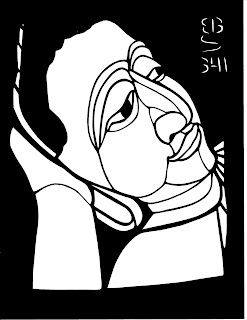Obaa-chan*
Obaa-chan, your childless carriage pushed with a back bowed by a meager war diet and the weight of a post-industrial society that has moved from feudal to digital in your lifetime. Where have your children gone?
Was it a .50 caliber round through the chest on Mindanao? His youthful, pensive face staring back through the smoke of your prayer incense. Or perhaps it was a Bullet-Train out of town when she could no longer stand the smell of the farm?
Where have your children gone?
Maybe off to the Juku, or the sex club? Your knowing, patient hands still cooking meals for a generation no longer interested in waving the Rising Sun, dusting off pictures of the Emperor, or toasting victories in Canton.
Obaa-chan, I know you were once young, but do your grandchildren know that you had hair as shining and skin as soft and fair as any who now peddle their flesh in Ginza on a cell phone? Do they know that the takuwan pickles in their bento are from a recipe you learned as a girl at a time when you weren't allowed to speak in the presence of your father without permission?
Do they know you are day-care to a generation, and rain-swept, roadside grime and mud labor to a nation?
I know, but I could never have endured as you have through wars, famine, and now isolation. I know, because you once showed me your picture as a young girl in monpei, bidding your brother farewell at the train station. So handsome in his uniform; you bowed stoically as he headed to his grave in the Pacific.
But I will not bother you now for a story. You are too busy knocking the snow off rows of long, white radishes drying in the winter sun and setting up an offering of rice for your brother's long awaited return.
*When I first visited Japan almost 35 years ago, I often saw Obaa-chans (grandmothers) in the Japanese countryside with terribly bowed backs. Purportedly caused by a calcium poor war diet and long hours stooped rice fields. They would often be pushing a cart that looked something like a cross between a baby carriage and a shopping cart. It struck me that this nation would truly have been lost after the war had it not been for these stout, resolute women.
Was it a .50 caliber round through the chest on Mindanao? His youthful, pensive face staring back through the smoke of your prayer incense. Or perhaps it was a Bullet-Train out of town when she could no longer stand the smell of the farm?
Where have your children gone?
Maybe off to the Juku, or the sex club? Your knowing, patient hands still cooking meals for a generation no longer interested in waving the Rising Sun, dusting off pictures of the Emperor, or toasting victories in Canton.
Obaa-chan, I know you were once young, but do your grandchildren know that you had hair as shining and skin as soft and fair as any who now peddle their flesh in Ginza on a cell phone? Do they know that the takuwan pickles in their bento are from a recipe you learned as a girl at a time when you weren't allowed to speak in the presence of your father without permission?
Do they know you are day-care to a generation, and rain-swept, roadside grime and mud labor to a nation?
I know, but I could never have endured as you have through wars, famine, and now isolation. I know, because you once showed me your picture as a young girl in monpei, bidding your brother farewell at the train station. So handsome in his uniform; you bowed stoically as he headed to his grave in the Pacific.
But I will not bother you now for a story. You are too busy knocking the snow off rows of long, white radishes drying in the winter sun and setting up an offering of rice for your brother's long awaited return.
*When I first visited Japan almost 35 years ago, I often saw Obaa-chans (grandmothers) in the Japanese countryside with terribly bowed backs. Purportedly caused by a calcium poor war diet and long hours stooped rice fields. They would often be pushing a cart that looked something like a cross between a baby carriage and a shopping cart. It struck me that this nation would truly have been lost after the war had it not been for these stout, resolute women.
James Noah




